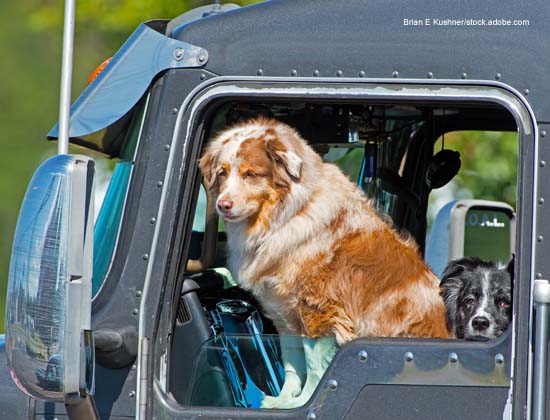A Canadian trucking organization is advocating for a postponement of new regulations related to dog imports.
On August 1, the U.S. Centers for Disease Control and Prevention (CDC) will enforce new regulations for importing dogs into the country. The CDC states that these regulations aim to prevent the reintroduction of the rabies variant associated with dogs, which has been deemed eliminated since 2007.
Despite the regulations’ goal of safeguarding public health, the Canadian Trucking Alliance warns that the new rules could significantly disrupt commercial vehicle operations and cross-border trade. They are requesting the CDC to delay the implementation until the New Year.
“Should these regulations be enforced as currently proposed, it could slow down shipments for commercial drivers traveling with dogs, potentially causing a backlog in secondary inspections that would affect all truck drivers, regardless of whether they have a dog,” stated the trucking group. “Moreover, there’s uncertainty about how border admissibility will be affected and how truck drivers with loads will be managed in cases of unintended noncompliance.”
The trucking group expressed concerns regarding “the policy’s framework, the rapid introduction, and the insufficient communication and awareness among travelers about this imminent change.”
The CDC announced these upcoming changes in May, allowing roughly three months for public preparation. Under the new requirements, all dogs entering the U.S. must:
- Appear healthy upon arrival
- Be at least six months old
- Be microchipped
- Have a receipt for an online submission of a CDC Dog Import Form
Additional regulations pertain to the location where the dog has resided in the past six months and whether it was vaccinated in the U.S. Furthermore, dogs arriving from high-risk rabies countries must be vaccinated against the disease.
Amid these impending regulatory changes, the Canadian Trucking Alliance is urging for a delay until January 2025 or until the CDC and the Canadian Food Inspection Agency resolve all concerns.
“Such actions will foster a more effective policy that protects our animals and enables all cross-border travelers to understand compliance,” stated Stephen Laskowski, president of the CTA.
On July 17, Canadian Health Minister Mark Holland expressed his concerns about the forthcoming changes, emphasizing that the new measures might strain supply chains. “These new CDC regulations risk adverse effects on our communities, supply chains, and local economies,” Holland remarked. “Our government has reiterated that many Canadians, including snowbirds and truckers, travel to the U.S. with dogs, and these regulations will impact people and economies on both sides of the border. We will continue to address these concerns with our U.S. counterparts to seek a solution.”
Both Holland and the trucking group highlight that Canada, like the U.S., is free from the rabies variant associated with dogs.


